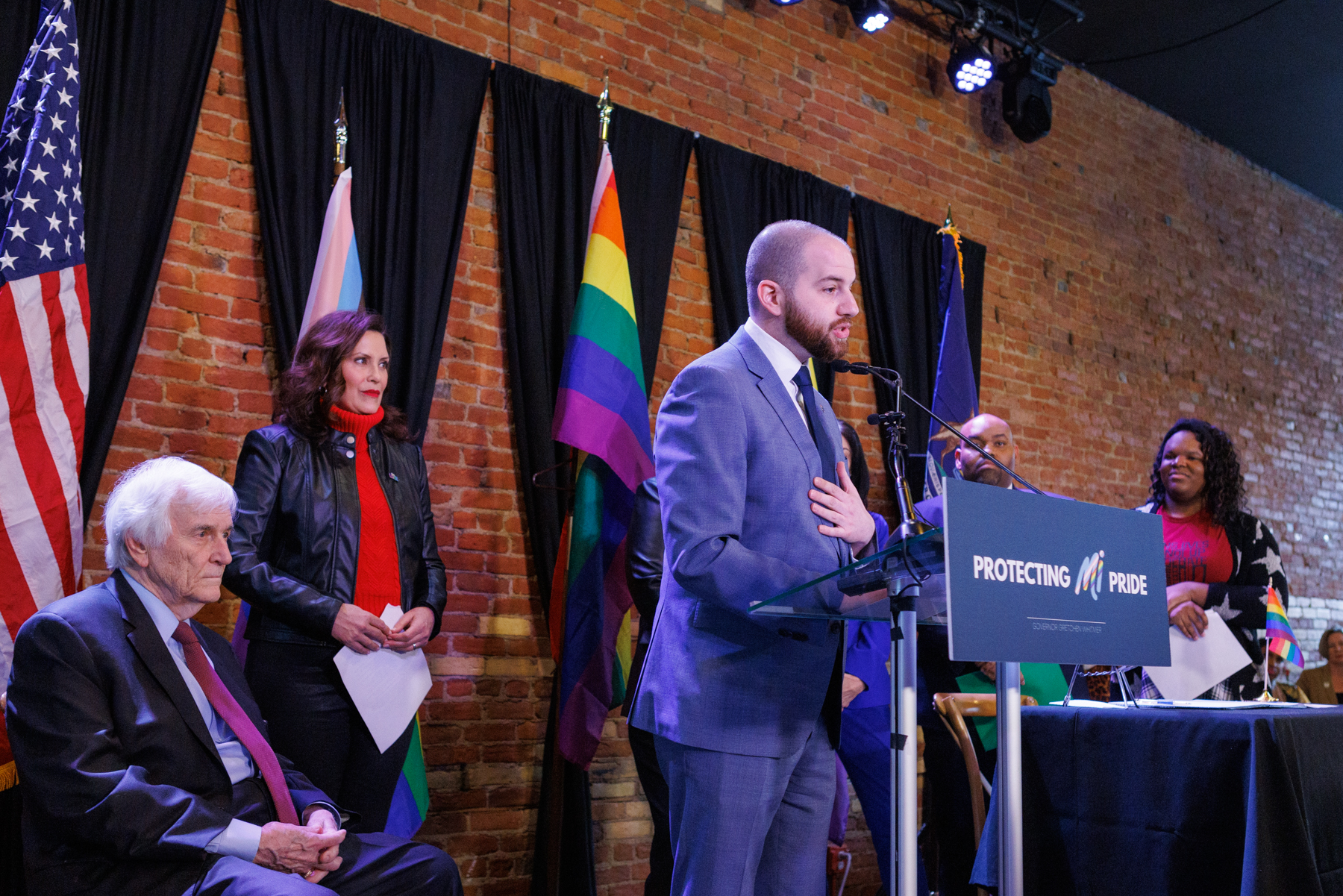On June 4, 2024, the Michigan Senate adopted Senate Resolution 126 recognizing June 2024 as Lesbian, Gay, Bisexual, Transgender, Queer+ (LGBTQ+) Pride Month. Sponsored by state Sen. Jeremy Moss (D-Southfield) and cosponsored by the entire Senate Democratic Caucus — but not a single Republican senator — this resolution is a renewal of Senate Democrats’ commitment to securing and expanding the rights of Michigan’s vibrant LGBTQ+ community.
For years, the previous Republican majority would not let me even bring up a resolution recognizing Pride Month in Michigan.
— Senator Jeremy Moss (@JeremyAllenMoss) June 5, 2024
Now in our our Democratic majority as we passed my resolution, I shared about the history of Pride in Michigan & the LGBTQ Michiganders who lived it:
🧵 pic.twitter.com/iH7wGRQvbU
While Michigan Democrats have long been staunch advocates for the state’s queer residents, Pride Month cannot be properly celebrated without first acknowledging and honoring the perseverance displayed by Michigan’s LGBTQ+ community in the face of discrimination, harassment and previous government inaction.
A Brief but Often Forgotten History
Before the events of the Stonewall Riots inspired activists across the nation to protest the over-policing and injustices, LGBTQ+ people in the U.S. faced social and legal persecution that threatened their lives daily.
In Michigan, queer individuals received no legal protections against discrimination and were often the victims of targeted and biased laws. Some of these laws had existed in one form or another since 1816 — even before Michigan became a state or even a fully incorporated territory. Through the years, Michigan’s LGBTQ+ community had seen these laws strengthened and continually used against them.
The decade before the Stonewall Riots was rife with McCarthyism, and the 1960s saw an increase in the harassment and ostracism of LGBTQ+ individuals, with tensions reaching a climax in 1969, when the events at the Stonewall Inn took place, ultimately resulting in the start of organized LGBTQ+ activism in Michigan in the following decade.
In 1972, Merrilee Melvin was fired from her job after coming out to a coworker. Shortly after, she was hired by the Michigan Gay Federation to plan a public gathering to commemorate the Stonewall Riots. In June 1972, Michigan’s first Pride March took place in downtown Detroit, protesting homophobic laws and advocating for LGBTQ+ rights. The event drew a few hundred people and, over the years, grew in attendance and popularity. Detroit’s Pride celebration, now known as Motor City Pride, is Michigan’s largest Pride celebration, with thousands attending each year.
Throughout the 1970s, activists in Michigan advocated for civil rights protections for the LGBTQ+ community and sought the population’s inclusion in the Elliott-Larsen Civil Rights Act. However, the law was passed in 1977 without any protection for the community. It would be over five decades until Michigan — under the first Democratic legislative majority in nearly 40 years — added any LGBTQ+ protections to its state laws.
The discovery of HIV/AIDS in the 1980s brought significant challenges for the LGBTQ+ community. Alongside battling a deadly virus with limited medical intervention, the community faced increased discrimination and oppressive laws. Media coverage often depicted AIDS sufferers as gay men, Black men, and intravenous drug users, linking the epidemic to marginalized groups. Despite political and social fear and widespread indifference, AIDS activists forced political and scientific establishments to address the crisis, funding prevention and research. This activism also advanced the conversation about gay recognition and rights in America.
By the 2000s, little progress was made in Michigan, and the equality movement faced even more setbacks, including a ban on marriage and civil unions for queer couples in the state Constitution. In 2014, an attempt was made to amend the Elliott-Larsen Act to include protections for the LGBTQ+ community; however, under a Republican majority, the amendment failed with little consideration.
Despite the historic 2015 U.S. Supreme Court case, Obergefell v. Hodges, which declared bans on marriage equality across the country unconstitutional, the language banning same-sex marriages still exists within the Michigan Constitution.
As recently as 2020, the then-Republican-controlled Legislature refused to pass a resolution introduced by Sen. Jeremy Moss — Michigan’s first openly gay state senator — acknowledging June 2020 as Pride Month in Michigan. Despite Michigan Republicans’ refusal to even bring Sen. Moss’ resolution to a vote, the then-majority party acted swiftly to proactively declare July 2020 as Craft Beer Month in Michigan — serving as a poignant example of how Michigan Democrats stand alone as the sole advocates for LGBTQ+ residents within the state Capitol.
Pride, Progress and Perseverance
Despite the hardships Michigan’s queer community has faced in the past — and even still today — Michigan has often been on the right side of history in the fight for equality.
On March 7, 1972, the city of East Lansing passed the first-ever anti-discrimination ordinance inclusive of sexual orientation in U.S. history. Later that same year, the city of Ann Arbor issued the country’s first government proclamation for “Lesbian-Gay Pride Week.”
In 2014, in response to the failure to amend the Elliot-Larsen Civil Rights Act, Michigan’s LGBTQ+ community and allies took decisive action to ensure proper representation in the State Legislature by electing Reps. Jon Hoadley and Jeremy Moss to the Michigan House of Representatives. The pair went on to establish the first LGBTQ+ Caucus in the state’s Legislature. Now, as a senator, Sen. Moss remains a dedicated member of the now seven-member-strong LGBTQ+ Caucus.
In 2015, future Michigan Attorney General Dana Nessel represented Michiganders April DeBoer and Jayne Rowse as joint plaintiffs in the landmark U.S. Supreme Court case that would go on to become Obergefell v. Hodges. This historic case legalized same-sex marriage and civil unions nationwide, rendering bans on marriage equality unconstitutional across the United States.
In 2020, Aimee Stephens, a trans Michigan woman who faced workplace discrimination and was ultimately fired from her role as a funeral director for being transgender, was among the plaintiffs when the U.S. Supreme Court ruled that the Federal Civil Rights Act protects LGBTQ+ individuals.
In 2023, the new Senate Democratic Majority wasted no time in taking action and passed Sen. Moss’ bill to expand the Elliott-Larsen Civil Rights Act, reaffirming and expanding legal protections for the LGBTQ+ community.
Sen. Jeremy Moss presides over the Michigan Senate on March 1, 2023, as Senate Democrats celebrate the passage of the expanded Elliott-Larsen Civil Rights Act.
As a result of amending the Elliott-Larsen Civil Rights Act to include explicit protections for LGBTQ+ individuals, which, despite being passed last year, only went into effect this year due to the lack of Republican support needed for immediate effect — and 52 years after Michigan’s first Pride celebration and protest for LGBTQ+ equal rights — Michiganders finally have long-fought-for protections from discrimination based on sexual orientation, gender identity, or expression codified in state law — becoming the 24th state to do so.

Sen. Jeremy Moss joins Gov. Gretchen Whitmer and equality advocates as the expanded Elliott-Larsen Civil Rights Act is officially signed into law.
The Michigan Senate also passed bills — including Senate Bills 348 and 349, as well as House Bills 4616 and 4617 — to ban the harmful practice of conversion therapy by mental health professionals seeking to change the gender identity or sexual orientation of minors. The bills were signed by Gov. Gretchen Whitmer last July, making Michigan the 22nd state to ban conversion therapy.
In addition to expanding civil rights, increasing legal protections and the banning of harmful and scientifically unsound conversion practices, under the Democratic trifecta, Michigan has been ranked one of the most welcoming states for the LGBTQ+ community in the U.S. According to the Human Rights Campaign Foundation’s Municipal Equality Index, which ranks cities across the nation on criteria in five categories in relation to LGBTQ+ equality, Michigan cities received scores higher than the national average — with four out of the 11 cities included in the ranking receiving perfect scores.
Celebrating Michigan’s LGBTQ+ Community

During Pride Month, Michigan Senate Democrats join in and attend various events, festivals, marches and parades held across the state of Michigan.
On Saturday, June 1, 2024, LGBTQ+ Michiganders and allies across the state — from Ferndale to Keweenaw and Lansing in between — celebrated Pride and kicked off a month of Pride celebrations throughout Michigan to promote diversity, acceptance, and love. As a start to their celebrations this month, Senate Democrats were proud to attend Motor City Pride last weekend.
🏳️🌈 I’m proud to be the first MI Senate Majority Leader in history to march in the Detroit Pride Parade! 🏳️🌈 #detroitpride @dananessel @JeremyAllenMoss @davidwcoulter @SenErikaGeiss @JasonMHoskins @JasonMorganMI @JasperMartus @HaleyLive @LtGovGilchrist @GovWhitmer @SenStabenow pic.twitter.com/1NFlhUMKCi
— SML Winnie Brinks (@WinnieBrinks) June 9, 2024
While previous majorities and administrations led by the other party have been, historically, less-than-unsupportive of Michigan’s queer residents, making it impossible to pass legislation protecting and uplifting Michigan’s LGBTQ+ community, Michigan Democrats have long supported the community and have continued to champion the fight as the Majority for the People. This Pride Month, our Democratic senators are looking forward to continuing to celebrate at some of the many Pride celebrations happening throughout the state.
While the progress made so far has been long overdue — and more than 40 years in the making — Michigan Senate Democrats remain committed to championing the protection and advancement of Michigan’s LGBTQ+ community. This Senate Majority is dedicated to continuing the fight to make Michigan a state that is welcoming and safe for people of all sexual orientations, gender identities, races, religions, and socioeconomic backgrounds.
Read more from the Michigan Senate Democrats at SenateDems.com/press.





